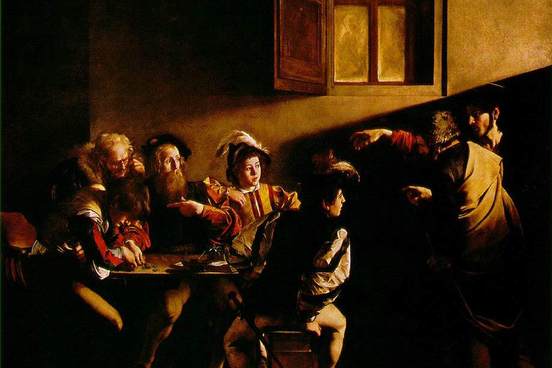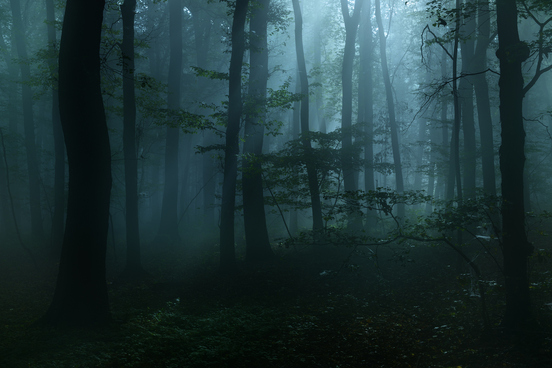
Stygian
Definition: extremely dark, gloomy, or forbidding
The "dark and gloomy" sense of stygian is a figurative one, as the original meaning of the word (which may also be found in capitalized form) was decidedly literal ("of or relating to the river Styx"). This was the river presided over by the boatman Charon, who would ferry across the souls of the dead on their way to the underworld of Hades. The literal sense began to be used in the early 16th century, and by the beginning of the 17th had taken on its figurative sense.
Now mischief, murder, wrath of hell drawth nere
and dyre Phlegethon flood doth blood require
Achilles death shalbe reuenged here
With slaughter such as Stygian lakes desyre
Her daughters blood shall slake the sprites yre,
Whose sonne we slew. wherof doth yet remayne,
The wrath beneath, and hell shalbe theyr payne.
—Lucius Annaeus Seneca (trans. by Jasper Heywood), The Sixth Tragedy, 1559

Umbra
The Latin word for shade or shadow is umbra, a word that has spread its shadow over a wide range of words in English. Umbra itself was first used in English to mean “phantom” or “ghost”—a meaning that came straight from one of its uses in Latin and was translated in some literary use in the 17th and 18th centuries, when shade was also used to mean “ghost.” Its more general meaning of “a shaded area” followed, but the specific one most pertinent to a solar eclipse is this one:
: a conical shadow excluding all light from a given source; specifically : the conical part of the shadow of a celestial body excluding all light from the primary source
This conical shadow is what is what causes darkness in an eclipse:
It will be the first time in 99 years that the path of the eclipse will trace a shadowy swath across the entire country as the moon slowly passes in front of the sun. This will result in the moon's umbra, or darkest part of its shadow, to be projected onto the Earth.
—Mark Wilson, The Indianapolis Star, 20 August 2017
A related word describes the partial shadow that surrounds the area of greatest darkness, penumbra (pene- is the Latin prefix meaning “almost”).
Other words incorporating umbra in their etymologies include:
adumbrate (to foreshadow; to suggest; to obscure)
inumbrate (to put in shadow)
sombra (the shady side of a bullfight arena)
burnt umber (a dark brown color)
umbrage (shade; suspicion; resentment)
umbrella (device for protecting from rain)
umbrous (shady)

Crepuscule
Crepuscule is a fancy word for twilight, the former coming from a Latin root, the latter from Middle English. Because so many words have come into English from Latin (and from French, which brings along Latin roots indirectly), we have many near-synonyms, one from each root language, that have different connotations and usage. Typically, the word with English roots is the more basic, everyday word and the Latinate synonym has a more technical or formal flavor:
ask/inquire
begin/commence
bug/insect
job/vocation
Such is the case here. Crepuscule comes from the Latin word crepusculum (“twilight, dusk”), which developed from creper, meaning “dusky” or “dark,” but also could have the figurative meaning “obscure,” “doubtful,” or “uncertain.” Use of the word in English goes all the way back to Chaucer in the late 1300s, when he used the more Latinlike spelling crepusculus. It is more than likely that the word’s use in English in later centuries was influenced by French, which settled on the spelling crépuscule and is much more frequently used than in English, since it does the double duty of both twilight and crepuscule. Like twilight, crepuscule is occasionally used figuratively to mean “a period of decline,” as in “their twilight years”:
[Queen Elizabeth II] cannot step down no matter how much she would like to. Certainly, it would make her life far more attractive in the crepuscule of life, but that is not to be.
—CNN transcript, 14 February 2002
The adjective crepuscular (“of, relating to, or resembling twilight” or “dim”) is used much more frequently in contemporary English than crepuscule.

Tenebrous
Tenebrous means “shut off from the light,” a synonym of dark or murky. It came to English through French from the Latin word tenebrosus, itself derived from tenebrae, meaning, according to the Oxford Latin Dictionary, “the more or less complete absence of light, darkness,” “the darkness of night,” and “(as of squalid or disreputable buildings, etc.) a dark corner, den.” Tenebrae had a life of its own as an English word referring to a very specific religious service:
: a church service observed during the final part of Holy Week in commemoration of the sufferings and death of Christ with the public chanting of psalms and the progressive extinguishing of all candles until only one remains burning behind or under the altar
Like most words referring to literal darkness, tenebrous also can be used in a figurative way to mean “hard to understand” or “obscure”:
We are also testing our own digital ad network, which will provide a measurable, high quality audience for advertisers, who are increasingly wary, and rightly so, about the murky, tenebrous world of digital advertising.
— Statement of Robert Thomson, Chief Executive of News Corp On Havas Media Group UK Decision To Pull Advertising From Google and YouTube, Business Wire, 17 March 2017
Several related words have been occasionally used in English: Samuel Johnson entered tenebricose (“dark”) and tenebrosity (“darkness, gloom”) in his 1755 dictionary, and the unabridged Webster’s Second from 1934 entered tenebra (“darkness”), but all three terms are quite rare. Still others include tenebrific (“gloomy” or “causing gloom or darkness”), as well as tenebrious, and tenebrose, variant spellings of tenebrous.
Tenebrism is used to designate a style of painting in which most of the people shown are in shadow, with others lit clearly with a beam of light, exemplified in the works of Caravaggio.

Gloaming
Gloaming is a synonym of “twilight” or “dusk.” It comes from the Old English word for twilight, "glōm," which is akin to "glōwan," meaning "to glow," and was originally used in Scottish dialects of English. Gloam itself was used as a verb meaning “to grow dark” and, in Noah Webster’s dictionary from 1828, meaning “to be sullen” (he connected the word to glum, which we recognize today as related to gloom and not a descendant of glow).
As a noun, gloam is used to mean “darkness” or “twilight” and is listed as archaic in our dictionary. It was used in Keats’s poem La Belle Dame sans Merci:
I saw pale kings and princes too,
Pale warriors, death-pale were they all;
They cried—“La Belle Dame sans Merci
Hath thee in thrall!”
I saw their starved lips in the gloam,
With horrid warning gaped wide,
And I awoke and found me here,
On the cold hill’s side.

Somber
Definition: gloomy, sullen, melancholy, or dejected in appearance or mood
We most often use somber these days to refer to a mood, but the word has had a number of, if you will excuse the word, shades of meaning over the years. One of the earliest of these meanings was "so shaded or full of shadows as to be dark and gloomy; lacking light or brightness." Somber came to English from the French word sombre ("dark"), and may still be found occasionally spelled in the same fashion. Currently our earliest evidence for the word comes from the late 17th century, in a play by Cyrano de Bergerac (who was the actual Cyrano de Bergerac on whom Edmond Rostand's 1897 play was based).
The terrible clucking of the Toads that crawled in the Vessel, made me wish my self Deaf; I felt Asks creeping by my Thighs, Serpents twisting about my Neck; and one I espied by the somber light of his sparkling Eyes, from a Mouth black with Venom, darting a forked Tongue, whose brisk Agitation made it look like a Thunder-bolt, set on Fire by its Eyes.
—Cyrano de Bergerac (trans. by A. Lovell), The Comical History of the States and Empires of the Worlds..., 1687

Caliginous
Definition: misty, dark
The English language has a healthy number of words that end in -ous. It also has a large number of words that mean "dark." Given this, you might assume that we also have a significant number of words ending in -ous that are concerned with darkness … and you would be correct! For in addition for caliginous we have such murky specimens as tenebrous ("shut off from the light"), fuliginous ("dark, having the color of soot"), opacous ("opaque; lacking illumination"), and carbonous ("brittle and dark or almost black in color").
Having accomplish'd a long lapse of time,
Thou shalt revisit light; and Jove's wing'd dog,
Sanguineous, the ferocious eagle, cow'ring
All day, an uninvited banqueter,
The ragged garment of thy form shall rend,
And make his feast upon thy dusky liver.
Nor any issue to such woe expect,
Or ere some god, vicarious in thy pangs,
Appear, and visit unillumined hell,
And the Tartarean depth caliginous.
—Aeschylus (trans. by Elizabeth Barrett Browning), Prometheus Bound, 1833

Photophobic
Definition: growing best under reduced illumination
Photophobic is most often encountered in fairly technical settings, such as describing the sensitivity of an eye to light, or the climate in which certain plants will best grow. However, it is occasionally found in figurative use, and so you may, if you like, use it as a reference for shaded climes (and even if it had not yet been used figuratively, there is no rule that prohibits anyone from being the first to do this with a word).
The left eye was somewhat reddened and phototropic. The patient was again received into the Charite, was one night seized with an apoplectic attack, and dies soon after.
—Moritz Heinrich Romberg (trans. by E. H. Sieveking), A Manual of the Nervous Diseases of Man, 1853





